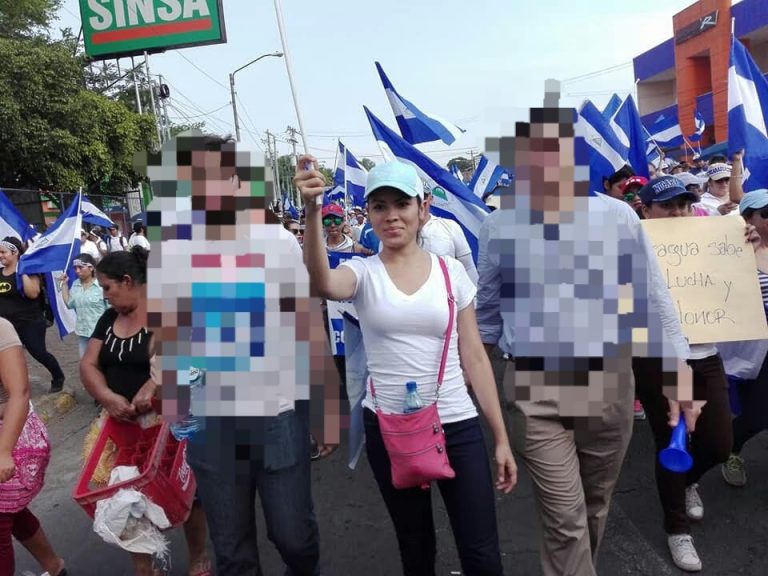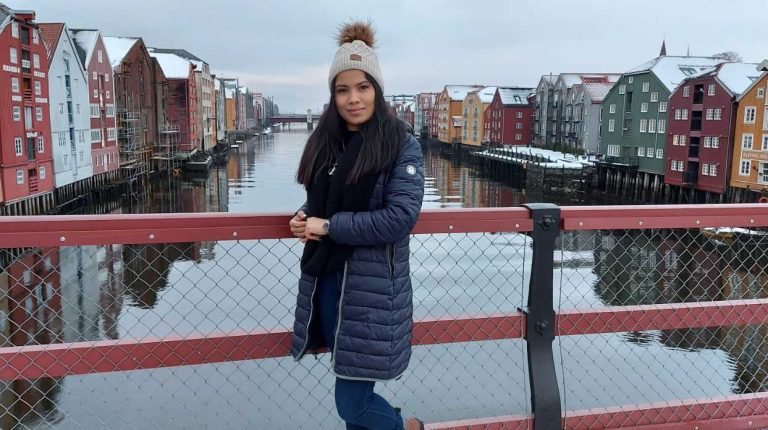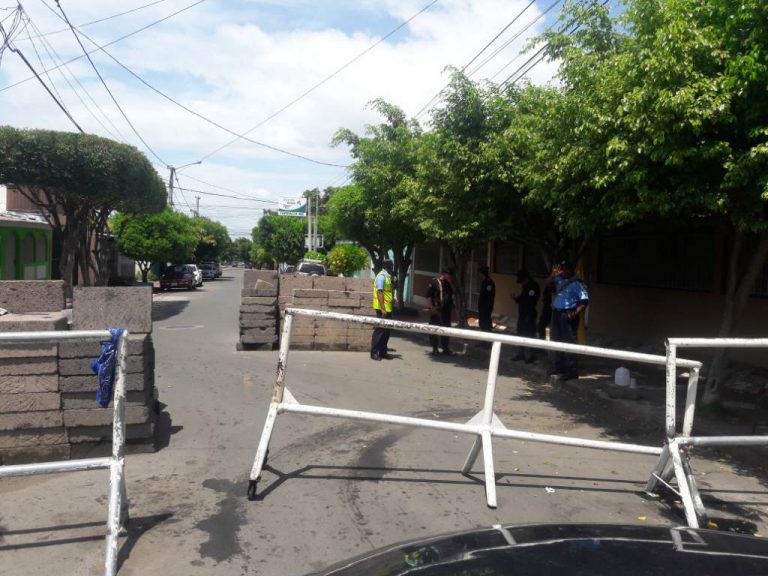
Children of Exile: The Births “Sowing Hope” in the Camp of Nicaraguan Farmers

PUBLICIDAD 1M
PUBLICIDAD 4D
PUBLICIDAD 5D
Silvia endured persecution and harassment under the Ortega regime. Norway, doesn’t feel she’s in danger since she doesn’t have a high political profile

Silvia Herrera endured persecution and harassment under the Ortega regime. Norway doesn’t feel she’s in danger since she doesn’t have a high political profile
Silvia Herrera was working in IT package sales for the GBM company, a Managua firm that’s part of the Pellas group. These packages, she explains, are “where you sell the equipment, its installation and the technical support needed.”
Previous to this job, she’d already had experience in State contract bidding. That’s why she was designated as the one to handle the portfolio of government clients. It was her job to establish contact and then deal directly with the Nicaraguan state workers. Among them were many party allies of the Ortega-Murillo regime.
Silvia led a peaceful life in Managua’s Altagracia neighborhood. Without great ups and downs, her life was focused on her profession and her family. However, in 2018, when she saw the Ortega-Murillo regime’s violent repression of protesting citizens, that all changed.
From the beginning, Silvia decided to support the protests. “I got involved when I saw the police attacking the elderly and killing the youth at the universities. They were violating the rights of disarmed civilians and repressing anyone who raised their voices.”
“I contacted my friends to collect money for food. I also collected money from people I knew outside the country, to buy medicine. Then I delivered these items personally to the collection centers, using my own car on different occasions,” Silvia stated. Another of her chief motivations was her sister, who was studying at Managua’s National Nicaraguan Autonomous University (UNAN). “Supporting them [the protesting students] was the right thing to do, civically and morally.”

Engineer and company manager Silvia Herrera endured persecution and harassment under the Ortega regime. Norway, however, doesn’t feel she’s in danger since she doesn’t have a high political profile on social media.
On various occasions, Silvia also delivered food to the students who were occupying the university. “I used my lunch hour to deliver food and medicine to the Managua Cathedral or the UNAN. Those were the two supply collection centers that were closest to me. Sometimes I stayed at the UNAN for a few minutes to talk with the students who were occupying the campus. I’d listen to their stories. Many of them hadn’t been home for days. They hadn’t seen their mothers. That motivated me to continue supporting them.”
“One night, my aunt went with me in my car to bring food to the students in the UNAN. When I left the university, I took the suburban highway route at the students’ suggestion. It was usually the least trafficked route, but this day there were paramilitary on guard in the zone. They followed us and shot at us. We managed to lose them on the road by taking various shortcuts. However, that night they got my license plate number and identified me.”
Silvia’s solidarity didn’t go unnoticed by the dictatorship’s sympathizers. In May 2018, her nightmare was deepened by a phone call.
“I got a call from a ‘friend’, a former classmate from the university, and the Student Union brigades there. He’d gone on to become a government worker and FSLN sympathizer. He called to ask me to pass on information from one of GBM’s sister companies, the Metropolitan Hospital. He wanted me to give him the names of medical personnel there who were attending to those wounded in the protests.” At the time, the public hospitals were under orders to close their doors to the wounded protesters.
When Silvia refused to serve as a spy, the ‘friend’ threatened her. “He told me that I knew the consequences of going against them and working in favor of the coup promotors. But my conviction was stronger.”
The Ortega-Murillo family regime reacted to the April civic rebellion by cloistering themselves in their El Carmen residence. Little by little, the police began creating a broad security perimeter around their domicile. The zealously guarded perimeter grew to include the “El Carmen” park and a large part of the Altagracia neighborhood.
Altagracia is one of the largest neighborhoods in Managua. The police and paramilitary set up checkpoints and kept a 24-hour watch on the neighborhood. Residents had to undergo interrogations every time they entered or left this extended perimeter. Sivlia’s house was one of many affected by these measures.

Silvia’s daily life in the Altagracia neighborhood was under constant watch by police and paramilitary. Courtesy photo
“After the security perimeter around Ortega was extended into the Altagracia neighborhood, it became a nightmare to be a dissident. The paramilitary frequently searched my vehicle upon entering and leaving. The first time, I refused to give them my name and exact address. Several neighbors then saw how they stopped me at one of the access points near the Puma gas station. They kept me there at gunpoint, as if I were a terrorist. They called the District III police chief. The head of the paramilitary group took pictures of my car, my aunt, and myself. Finally, they let me go, accompanied by a paramilitary. The guard followed me and then asked my next-door neighbor, a Sandinista, what my name was. That neighbor then gave him all my data,” Herrera recalled.
One of the checkpoints was just four meters from Silvia’s home. Because of this, she soon began to suffer sexual harassment and abuses from the paramilitary. She spoke of one of the most hostile incidents, which occurred in 2019.
“I was verbally and sexually harassed by the paramilitary. I asked them to respect me, and in response one of them physically attacked me. I was alone, but luckily this happened in the daytime and I screamed. If it had been at night, my fate might have been different. Probably my family would never have had any further news of me. I’d be reported as missing, then found dead a few days later.”
By September 2019, Silvia’s situation had become intolerable. Finally, a traffic incident was the definitive abuse that forced her into exile. “For a traffic violation, they took my license away. Two days after that, I was in my car near the Central ENEL building, on my way home. A pick-up began following me. When I stopped at the traffic light, a paramilitary got out, pistol in hand. He yelled at me: “Coup plotter, we have you on our list, get out of the car.” I sped up as fast as I could. Looking through the rearview mirror, I saw that they hit another car when they took off after me. That day, I decided to leave the country.”
Silvia had to leave Nicaragua by land. Then she passed through five different airports before she finally reached Norway. The prospect of recovering her sense of security and of reuniting with her sister, also in exile, kept her going. Still, it was a difficult and risky trip, with no certainty of success.
Things in the Norway haven’t been what she expected either. To date, she’s been struggling for a year and three months to have her voice heard by the Norwegian government.
Silvia Herrera arrived in Norway alone. Once there, she met Michelle Quezada, a niece through marriage. Together they lived in three different refugee centers: in Rade, Kasper and Trondheim.
During her time in exile, Silvia Herrera has suffered different symptoms of post traumatic stress disorder. She’s had nightmares, bouts of depression and panic attacks. As a vulnerable woman migrant, she’s suffered sexual harassment from some of the other refugees. “As a Latin American woman, I was the object of lust and unwanted advances from the men in the dining area. It was torture to come out of my room at the dinner hour. I felt sick to my stomach. The men would pass close to me, trying to rub against my arm or hair. I complained of the situation twice.”
The only alternative they eventually offered her was a transfer. That’s how she and Michelle Quezada were sent to another refugee center in Trondheim, the city were their relatives lived.
The news site Republica 18 was allowed to see the letters Silvia Herrera had received from the Norwegian Immigration Offices.
The first letter, dated July 2020, came from the Norwegian Immigration Agency (UDI). It admits the agency “is aware that the [Nicaraguan] police have taken energetic measures against demonstrations and other activities considered as opposing the government in power. We’re also aware that people who participated in demonstrations have been arrested. We know there are still people in prison as a result of the 2018 disturbances.”
In the same letter, the UDI concludes: “the decisive factor in our assessment of the risk of future persecution is if you’ve been a person with a high media profile. Or, if you’ve demonstrated political activity of such a nature and risk level as to become a center of attention for the authorities when returning to your country of origin.”
Silvia decided to appeal the decision. Unfortunately, the response from the Immigration Appeals Board (UNE) was two more denials, in August and again in October 2020. “They consider that my profile as a dissident doesn’t make me a vulnerable target for the Nicaraguan authorities,” she declared.
Up until now, Norway has denied political asylum to 38 Nicaraguans according to UDI data.
Their perception of events contradicts other reports prepared in Norway. In 2019, Landinfo, a Norwegian organization charged with providing immigration reports, published their findings. “The representative of the Norwegian organization affirms that those who participate in demonstrations run a great risk. The authorities take note of those who participate in protests and take action against them.”
In their third report, dated September 2019, Landinfo reaffirmed the risks Nicaraguans face. “Even people with no particular social or political profile have been detained in 2020, according to Tiziano Breda (International Crisis Group analyst). Their arrests were due to their participation in the 2018 demonstrations. Some of those arrested in 2019 and 2020 have been ordinary individuals.”
The appeals board resolution is also contradicted by reports from human rights organizations like Amnesty International. The Norwegian branch of the group is called Amnesty International Norge.
Amnesty’s latest report, “Silence at any cost: state tactics to deepen the repression in Nicaragua”, was released in February 2021. In it, the organization expressed its deep concern. “Human rights advocates fear the worst is yet to come. In the pre-electoral context, with an eye towards the November 2021 presidential elections, the human rights violations that have never stopped could worsen. Meanwhile the government seeks to silence all forms of opposition, at any cost.”
The Amnesty report also confirms “reports of an increase in harassment against those identified as government opponents. These can be human rights advocates, journalists, or victims of human rights violations and their family members. These acts continued without a pause.”
Silvia Herrera states that it doesn’t matter if the return is voluntary or forced. “In both cases, [Norway sends returnees] with an obligatory ticket to their country of origin. Your passport isn’t returned until your final destination.” Officials of the Trondheim refugee center explained that procedure to her. “Returning my passport to me in the Nicaraguan airport would mean going directly to the guillotine,” she declared anxiously.
Silvia currently remains in Norway where she and her family are preparing to make a final try. She’ll present her case directly to Norway’s Supreme Court in a last attempt to defend her right to live free from dictatorial violence.
PUBLICIDAD 3M
PUBLICIDAD 3D